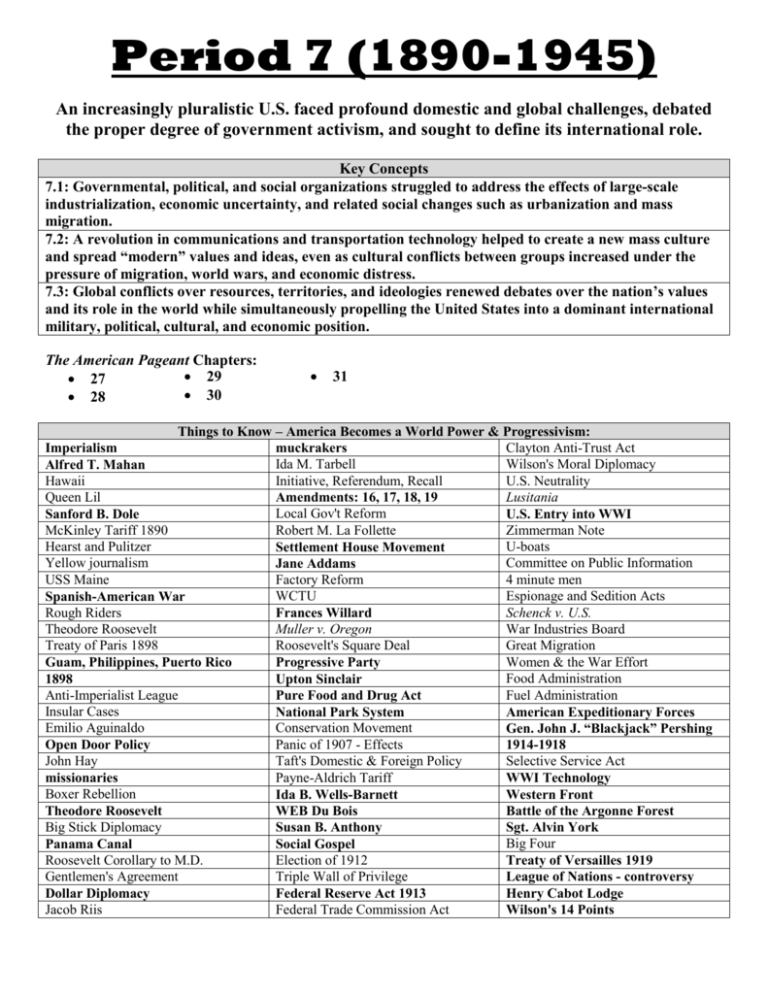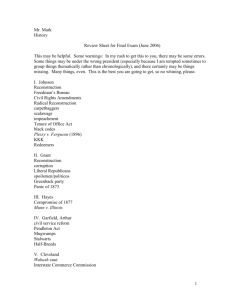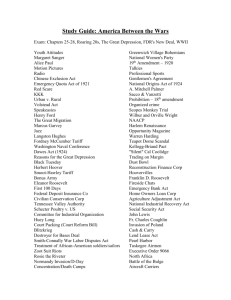Period 7 (1890-1945) An increasingly pluralistic US faced profound
advertisement

Period 7 (1890-1945) An increasingly pluralistic U.S. faced profound domestic and global challenges, debated the proper degree of government activism, and sought to define its international role. Key Concepts 7.1: Governmental, political, and social organizations struggled to address the effects of large-scale industrialization, economic uncertainty, and related social changes such as urbanization and mass migration. 7.2: A revolution in communications and transportation technology helped to create a new mass culture and spread “modern” values and ideas, even as cultural conflicts between groups increased under the pressure of migration, world wars, and economic distress. 7.3: Global conflicts over resources, territories, and ideologies renewed debates over the nation’s values and its role in the world while simultaneously propelling the United States into a dominant international military, political, cultural, and economic position. The American Pageant Chapters: 29 27 30 28 31 Things to Know – America Becomes a World Power & Progressivism: Clayton Anti-Trust Act Imperialism muckrakers Ida M. Tarbell Wilson's Moral Diplomacy Alfred T. Mahan Hawaii Initiative, Referendum, Recall U.S. Neutrality Queen Lil Lusitania Amendments: 16, 17, 18, 19 Local Gov't Reform Sanford B. Dole U.S. Entry into WWI McKinley Tariff 1890 Robert M. La Follette Zimmerman Note Hearst and Pulitzer U-boats Settlement House Movement Yellow journalism Committee on Public Information Jane Addams USS Maine Factory Reform 4 minute men WCTU Espionage and Sedition Acts Spanish-American War Rough Riders Schenck v. U.S. Frances Willard Theodore Roosevelt Muller v. Oregon War Industries Board Treaty of Paris 1898 Roosevelt's Square Deal Great Migration Women & the War Effort Guam, Philippines, Puerto Rico Progressive Party Food Administration 1898 Upton Sinclair Anti-Imperialist League Fuel Administration Pure Food and Drug Act Insular Cases National Park System American Expeditionary Forces Emilio Aguinaldo Conservation Movement Gen. John J. “Blackjack” Pershing Panic of 1907 - Effects Open Door Policy 1914-1918 John Hay Taft's Domestic & Foreign Policy Selective Service Act Payne-Aldrich Tariff missionaries WWI Technology Boxer Rebellion Ida B. Wells-Barnett Western Front Theodore Roosevelt WEB Du Bois Battle of the Argonne Forest Big Stick Diplomacy Susan B. Anthony Sgt. Alvin York Big Four Panama Canal Social Gospel Roosevelt Corollary to M.D. Election of 1912 Treaty of Versailles 1919 Gentlemen's Agreement Triple Wall of Privilege League of Nations - controversy Dollar Diplomacy Federal Reserve Act 1913 Henry Cabot Lodge Jacob Riis Federal Trade Commission Act Wilson's 14 Points The American Pageant Chapters: 32 33 34 Things to Know – Roaring 20s, Great Depression, & New Deal: Edward Hopper Red Scare Mexican Deportation (Depression) Fundamentalism v. Modernism Election of 1932 Emergency Quota Act 1921 FDR's 1st Hundred Days Immigration Act 1924 Amer. Indian Citizenship Act 1924 quota system Eugenics New Deal Washington Naval Conference Banking Reform (Acts/Orgs.) Prohibition Organized Crime in Chicago 1929 FDIC Scopes Monkey Trial Laissez-faire SEC Clarence Darrow Harding’s Return to Normalcy Social Security fireside chats William Jennings Bryan stock market speculation Employment/Labor Reform Glenn Curtiss Teapot Dome Scandal Automobiles Kellogg-Briand Pact Luisa Moreno Fordney-McCumber Tariff Farming Reform (Acts/Orgs.) Henry Ford Dawes Plan 1924 National Recovery Administration Assembly line manufacturing Hawley-Smoot Tariff Indian Reorganization Act 1934 Charles Lindbergh Tennessee Valley Authority Radio Age Black Tuesday Motion Pictures Housing Reform (Acts/Orgs.) Causes of the Great Depression Hoovervilles Flappers FDR's Court-packing plan Jazz Bonus Army deficit spending Hatch Act Harlem Renaissance Dust Bowl Federal Writers’ Project Marcus Garvey Franklin Roosevelt (FDR) Lost Generation New Deal Critics (Huey Long) Eleanor Roosevelt The American Pageant Chapters: 35 Isolationism as Foreign Policy Stimson Doctrine Dictatorships: Italy, Germany, Japan Appeasement "Quarantine Speech" Nonaggression Pact Neutrality Acts Cash and Carry Policy Lend-Lease Act Atlantic Charter Convoy System German, Italian, Japanese Aggression Pearl Harbor 1939-1945 FDR Truman US Office of War Information Executive Order 9066 36 Things to Know – WWII: internment Korematsu v. US Wartime Agencies Manhattan Project Women and the War Effort Minorities and the War Effort Battle of the Atlantic Development of sonar Battle of Stalingrad Battle of Normandy (D-Day) Battle of the Bulge Battle of the Coral Sea Battle of Midway Island-Hopping Bataan Death March Liberation of concentration camps Omar Bradley Dwight Eisenhower Douglas MacArthur Chester A. Nimitz George Marshall George Patton Battles of Iwo Jima and Okinawa Manhattan Project Use of Atomic Bomb – controversy Nuremberg Trials Effects of WWII Bracero program Immigration to the US War bonds Victory Gardens Tuskegee Airmen Flying Tigers Navajo Code Talkers rationing Vernon J. Baker





